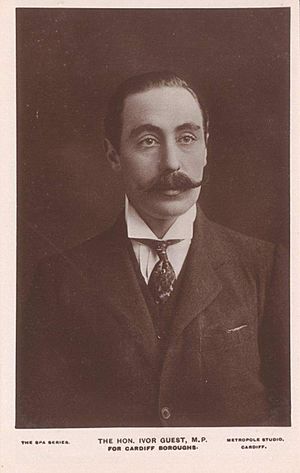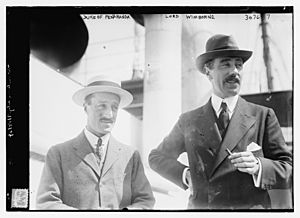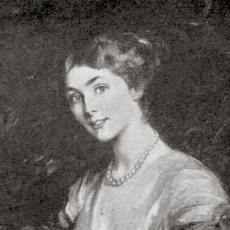Ivor Guest, 1st Viscount Wimborne facts for kids
Quick facts for kids
The Viscount Wimborne
|
|
|---|---|
 |
|
| Lord Lieutenant of Ireland | |
| In office 17 February 1915 – 9 May 1918 |
|
| Monarch | George V |
| Prime Minister | |
| Preceded by | The Earl of Aberdeen |
| Succeeded by | The Viscount French of Ypres |
| Personal details | |
| Born |
Ivor Churchill Guest
16 January 1873 Wimborne House, Arlington Street, London |
| Died | 14 June 1939 (aged 66) Wimborne House, Arlington Street, London |
| Nationality | British |
| Political party | |
| Spouse |
Alice Grosvenor
(m. 1902) |
| Children | 3 |
| Parents | Ivor Guest, 1st Baron Wimborne Lady Cornelia Spencer-Churchill |
| Alma mater | Trinity College, Cambridge |
Ivor Churchill Guest, 1st Viscount Wimborne (born January 16, 1873 – died June 14, 1939) was an important British politician. He was also known as Lord Ashby St Ledgers and later Lord Wimborne.
He served as one of the last Lords Lieutenant of Ireland. This was a very important job, like being the King's representative. He held this position during the time of the Easter Rising in 1916.
Contents
Early Life and Education
Ivor Churchill Guest was the oldest son of Ivor Guest, 1st Baron Wimborne. His mother was Lady Cornelia Henrietta Maria Spencer-Churchill. This also made him a first cousin to Winston Churchill, who later became a famous Prime Minister.
He went to school at Eton and then studied at Trinity College, Cambridge.
After his studies, he joined the military. He became a lieutenant in the Dorset Yeomanry. When the Second Boer War started in South Africa, he volunteered to serve. He was awarded the Queen's South Africa Medal for his service.
Political Career Begins
Ivor Churchill Guest started his political journey in 1900. He was elected to Parliament for Plymouth. At first, he was a member of the Conservative Party.
However, in 1904, he decided to join the Liberal Party. This was because of a big debate about trade rules in the country. He supported free trade, like his cousin Winston Churchill.
He remained a Member of Parliament until 1910. That year, he was given a special title and became Baron Ashby St Ledgers. This meant he joined the peerage, which is a group of people with special noble titles.
After becoming a Baron, he served in the government. He was the Paymaster General, which meant he was in charge of government payments. He also worked as a Lord in Waiting to King George V. In 1914, he inherited another title, becoming Baron Wimborne, after his father passed away.
Leading Ireland During Wartime
In February 1915, Lord Wimborne was given a very important job. He was appointed Lord Lieutenant of Ireland. This role was mostly ceremonial, meaning it was more about showing respect than making big decisions. The real power usually belonged to other officials.
However, Lord Wimborne wanted to be more involved. He became the Director of Recruiting for Ireland in October 1915. He also made sure he was always updated on what was happening in the country. He received police reports and other important information.
The Easter Rising
The Easter Rising was a rebellion that happened in Dublin, Ireland, in April 1916. Before the rebellion started, a German ship carrying weapons for the rebels was captured. Lord Wimborne wanted to arrest many rebel leaders right away.
But other officials wanted to wait for permission from London. Before they got it, the rebellion began on April 24, 1916. Lord Wimborne quickly declared martial law in Dublin. This meant the military took control.
The rebels surrendered a few days later. After the Rising, Lord Wimborne offered to resign, but he was later re-appointed. A special investigation looked into the events of the rebellion. It found that Lord Wimborne was not to blame. It said his job was very difficult, especially during a crisis.
He continued to serve as Lord Lieutenant for two more years. When he retired in 1918, he was given an even higher title: Viscount Wimborne.
Family Life
On February 10, 1902, Ivor Churchill Guest married Alice Grosvenor. They had one son, Ivor Guest, 2nd Viscount Wimborne, and two daughters, Rosemary and Cynthia.
Lord Wimborne passed away in June 1939 at the age of 66. He died in the same house in London where he was born. His son, Ivor, took over his title. Lady Wimborne passed away in April 1948.
Images for kids
 | Sharif Bey |
 | Hale Woodruff |
 | Richmond Barthé |
 | Purvis Young |




